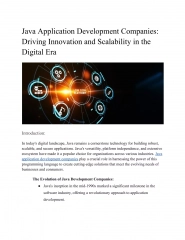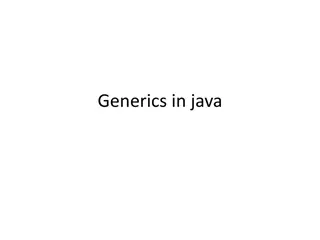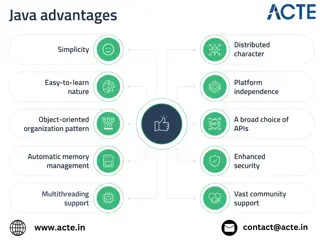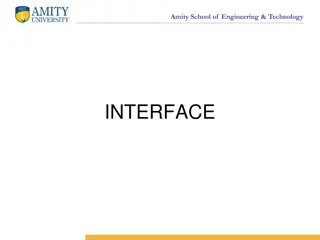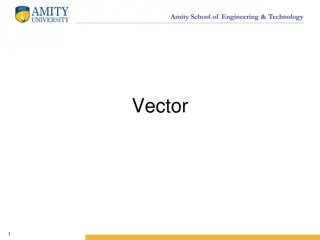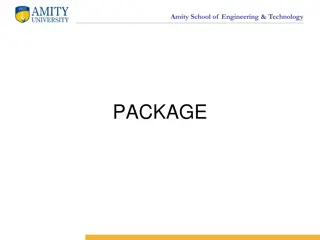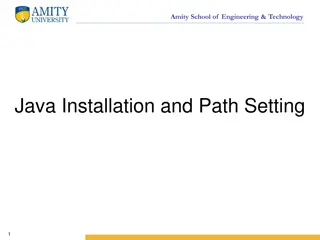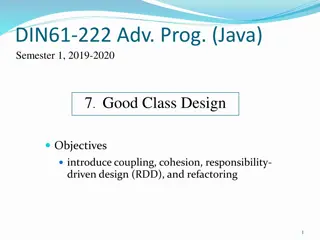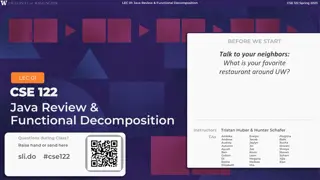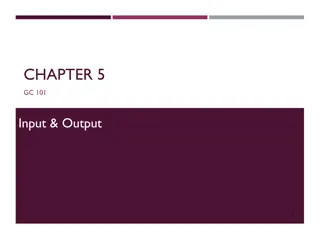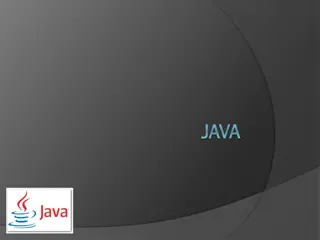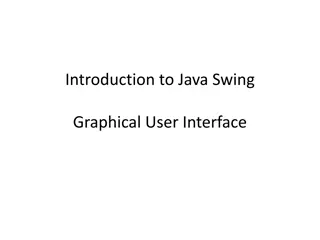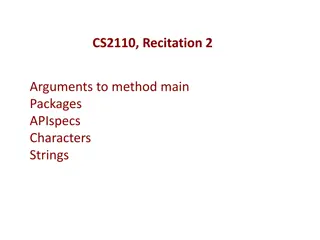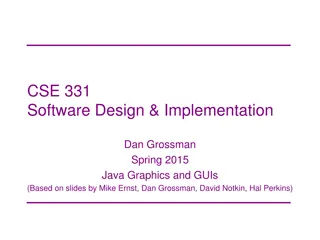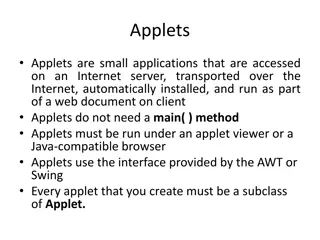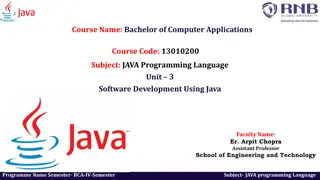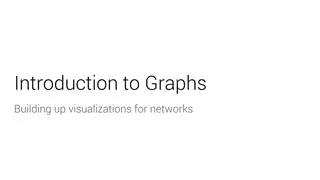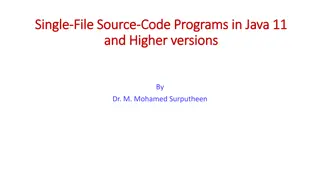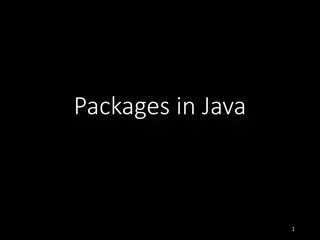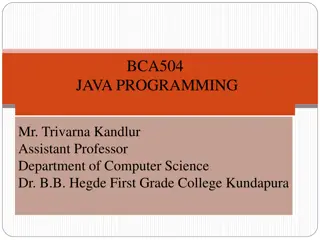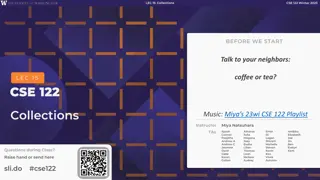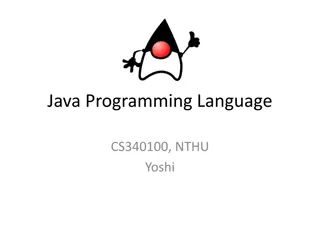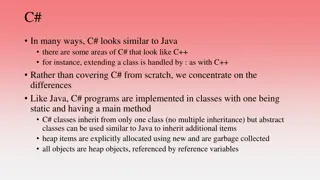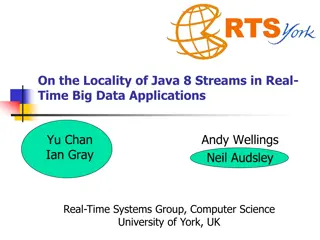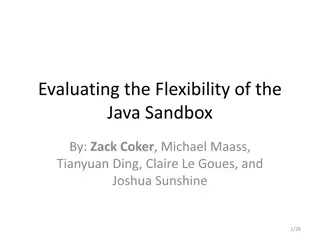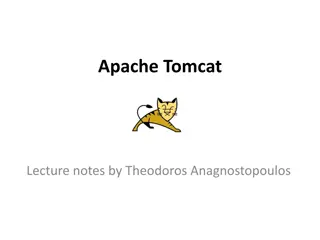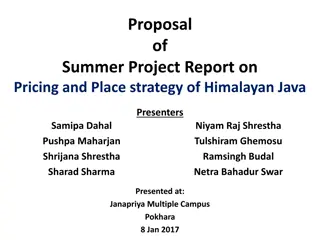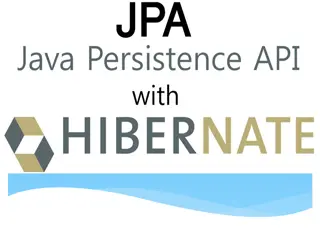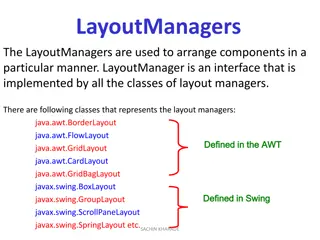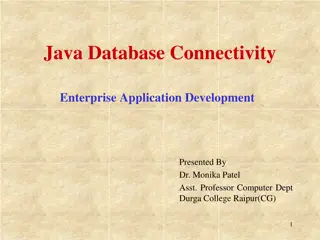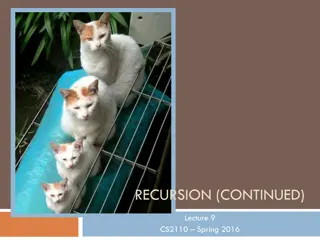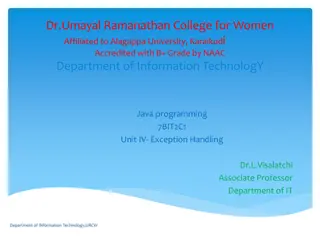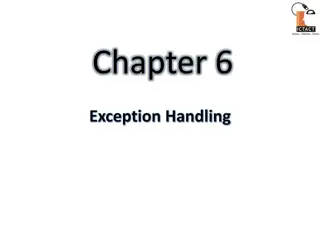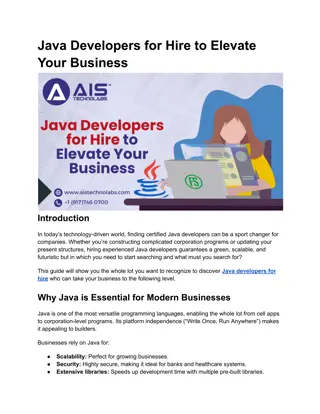Java application development company (1)
In today's digital landscape, Java remains a cornerstone technology for building robust, scalable, and secure applications. Java's versatility, platform independence, and extensive ecosystem have made it a popular choice for organizations across various industries. Java application development compa
2 views • 4 slides
Variables, Assignment,and Data Types
Explore key Java programming concepts such as variables, assignment, data types, Java keywords, printing strings, pseudocode, escape sequences, and more. These fundamental topics are essential for building a strong foundation in Java programming. Dive into code examples and explanations to enhance y
8 views • 13 slides
Generics in Java
Generics in Java allow for parameterized types, enabling the use of different data types in classes, interfaces, and methods. By creating generic entities, such as classes that work with various data types, Java programmers can write more flexible and reusable code. This concept is demonstrated thro
1 views • 16 slides
Understanding Java: The Backbone of Cross-Platform Development
Java stands as a cornerstone in the realm of programming languages, revered for its versatility and robustness. Enrolling in a Java Course in Pune significantly enhances one\u2019s ability to leverage Java\u2019s capabilities effectively. Understandi
1 views • 1 slides
Java Interfaces in Amity School of Engineering & Technology
Java interfaces are a key concept in object-oriented programming that allows for achieving multiple inheritance. The article discusses how Java interfaces work, their role in defining class behavior, and the differences between interfaces and classes. It also explains the syntax for declaring interf
4 views • 48 slides
Amity School of Engineering & Technology Vectors in Java
Amity School of Engineering & Technology Vectors provide a flexible way to manage dynamic arrays in Java programming. With capabilities to store objects of any type and accommodate dynamic resizing, these vectors offer optimized storage management through capacity and capacity increment settings. Co
0 views • 18 slides
Java Packages and Their Importance in Programming
An exploration of Java packages, their role in structuring code, organizing classes, and enhancing code reusability. Learn about built-in and user-defined packages, the Java API's package organization, and the different types of packages available in Java programming. Discover how packages help in c
2 views • 18 slides
Amity School of Engineering & Technology Java Installation Guide
In this detailed guide provided by Amity School of Engineering & Technology, learn how to install and set up Java on your system effectively. The step-by-step instructions cover downloading the Java installer, configuring the installation wizard, setting environmental variables, and more to ensure a
1 views • 19 slides
Class Design in Java Programming: Coupling, Cohesion, RDD, and Refactoring
Delve into the world of Java programming with a focus on class design principles such as coupling, cohesion, responsibility-driven design (RDD), and refactoring. Understand the importance of good design for code quality, ease of debugging, maintenance, and reusability. Dive into the adventure of Zuu
0 views • 39 slides
Java Review & Functional Decomposition in CSE 122 Spring 2023
Lecture 01 in CSE 122 covers Java review, functional decomposition, and code quality. Announcements include a Java review session, programming assignments, and reminders on Java syntax. The session encourages active participation through in-class activities using Slido polls. Students are also urged
0 views • 24 slides
Interactive Programs and Input/Output in Java
Interactive programs in Java allow users to input data through the console, which can be captured and used in the program. This involves using the Scanner class to read user input, and understanding common Scanner methods to process different types of input. Importing Java class libraries is essenti
2 views • 15 slides
Learning Swing with Java Foundation Classes (JFC) and Swing
Java Foundation Classes (JFC) and Swing provide a powerful set of tools for building graphical user interfaces in Java applications. This includes Swing GUI components, pluggable look-and-feel support, accessibility APIs, Java 2D graphics, and internationalization capabilities. By learning Swing wit
1 views • 11 slides
Java Swing for Building Graphical User Interfaces
Java Swing is a powerful framework for creating graphical user interface applications in Java. It provides a wide array of visual components such as JFrame, JComponent, and JPanel, enabling developers to build interactive and visually appealing applications easily. With Swing, developers can design
1 views • 25 slides
Graphical User Interfaces (GUIs) and JOptionPane in Java
Introduction to Object-Oriented Programming (OOP) and GUI concepts in Java, focusing on GUI hierarchy, designing GUIs, working with containers and components, utilizing JOptionPane for graphical input/output, and examples of showMessageDialog and showConfirmDialog in Java applications.
0 views • 90 slides
Java Application Development Basics
Learn how to create a Java application with a main method using Eclipse. Understand the concept of method parameters and how to provide arguments when running the application through Eclipse's Run Configurations feature. Explore the structure of packages in Java and the Java API.
0 views • 26 slides
Introduction to Java Graphics and GUIs in Software Design & Implementation
Introduction to Java graphics, Swing/AWT libraries, event-driven programming, user interaction, essential terminology, and perspective in software design & implementation using Java. The material covers organization of AWT/Swing library, essential widgets/components, graphics, user events, and build
0 views • 30 slides
Java Applets - Basics and Functionality
Java applets are small applications accessed and run on web clients. They do not require a main method and utilize the AWT or Swing interface. Applets can be subclassed from the Applet class and come in two types: AWT-based and Swing-based. Repainting applets can be achieved by calling the repaint()
1 views • 20 slides
Java Programming: BCA IV Semester Course Overview
This Bachelor of Computer Applications (BCA) course focuses on Java programming language fundamentals, object-oriented concepts, software development principles, and practical application skills. Students will learn to define Java program features, implement object-oriented features, work with array
0 views • 31 slides
Graphs: Visualizations and Representations in Java
Delve into the world of graphs with a focus on visualizations for networks and building up graph representations in Java. Explore different graph representations, adjacency lists, and key-value mappings, along with insights on storing and tracking data efficiently using Java data structures. Dive in
0 views • 12 slides
Single-File Source Code Programs in Java 11
Explore the concept of single-file source code programs in Java 11, where the entire program is contained within a single .java file without external dependencies. Learn how to compile and run these programs both before and after Java 11, and discover the new feature of executing Java programs direc
0 views • 11 slides
Scanner Class in Java: Reading User Input and Processing Files
The Scanner class in Java's java.util package allows reading input from the keyboard or files. It looks for tokens in the input, reads different types of values, and has methods like nextInt() and nextLine(). You can also read from files by creating a File object. Learn how to use Scanner to interac
0 views • 21 slides
Packages in Java: A Comprehensive Overview
Packages in Java play a crucial role in organizing and structuring code for efficient reuse and maintenance. They allow you to group related classes together, provide encapsulation, and facilitate code organization. This article dives into the basics of Java packages, advantages they offer, differen
0 views • 19 slides
Introduction to Java Programming: Basics and Applications
Java, developed by James Gosling, is a versatile object-oriented programming language used for mobile, desktop, web applications, servers, games, and more. It is renowned for its platform independence, popularity, ease of use, security, and strong community support. This subject delves into Java fun
0 views • 15 slides
Optional Class in Java Collections
The Optional class in Java is a powerful tool used to handle scenarios where a value may or may not be present. It provides methods like isPresent(), isEmpty(), and get() to work with potentially absent values. Optional.of() and Optional.empty() are key methods to create instances of Optional object
0 views • 18 slides
Java Programming: Common Misconceptions Debunked
Explore and debunk common misconceptions about the Java programming language, from its relation to other languages and performance comparisons to memory management and real-life applications. Uncover the truths behind these myths to gain a clearer understanding of Java's capabilities and versatility
0 views • 16 slides
Java Overview and Basics: Understanding the Fundamentals of Java Programming
Java is a versatile programming language known for its simplicity, security, portability, and high performance. Its history dates back to 1990 when the concept was first suggested, leading to the creation of Java in 1995 by James Gosling. Over the years, Java has evolved with various versions introd
1 views • 65 slides
Overview of Java Programming Language
Java is a versatile and powerful programming language created by James Gosling and others at Sun Microsystems in the 1990s. It aims for portability, reliability, safety, simplicity, and efficiency. With a strong focus on object-oriented programming, Java has evolved over the years with a rich histor
0 views • 33 slides
Mastering Generics in Effective Java: A Practical Guide for Java Programmers
Explore the world of generics in Java through Joshua Bloch's guidance in "Effective Java". Learn the importance of avoiding raw types, leveraging parameterized types for type safety, handling mixing of generic and raw types, and implementing wildcards for flexible and typesafe coding. Enhance your J
0 views • 30 slides
Differences Between C# and Java: A Comparative Overview
C# and Java share similarities in syntax and features, but there are key distinctions that set them apart. From class inheritance to memory management, this comparison highlights the unique aspects of C# programming. Explore how C# diverges from Java in terms of multiple inheritance, explicit heap a
0 views • 16 slides
Locality of Java 8 Streams in Real-Time Big Data Applications
The study explores the impact of ccNUMA and locality on Java 8 Streams, focusing on their complexity and implementation in real-time Big Data applications. It discusses the Java support for server computers in clusters, the use of streams for programming models, and considerations for extending stre
0 views • 22 slides
Java Sandbox Flexibility and Usage
The research delves into evaluating the flexibility and practical usage of the Java sandbox in dealing with Java applications. It highlights the importance of investigating how security tools are utilized, aiming to enhance security mechanisms and differentiate between malicious and benign code. The
0 views • 28 slides
Apache Tomcat: An Open Source Implementation of Java Servlet and JSP Technologies
Apache Tomcat is an open-source software implementing Java Servlet and JavaServer Pages technologies. It is developed under the Java Community Process and released under the Apache License version 2. Apache Tomcat powers large-scale web applications and is a collaboration of developers worldwide. Le
0 views • 6 slides
Study on Pricing and Place Strategy of Himalayan Java Coffee: A Detailed Analysis
This report delves into the pricing and place strategies of Himalayan Java coffee, focusing on factors influencing coffee pricing and selection of outlet locations. The study aims to identify the target market, understand competitive dynamics, and analyze factors impacting coffee sales at Himalayan
0 views • 10 slides
Java Persistence API (JPA) for Data Management in Java Applications
Java Persistence API (JPA) is a specification that provides a framework for managing relational data in Java applications. It simplifies ORM solutions, offers vendor independence, and supports test-driven development with annotation-driven mapping.
0 views • 31 slides
Layout Managers in Java
Layout Managers in Java provide a way to organize components within a graphical user interface. They include classes like BorderLayout, FlowLayout, GridLayout, CardLayout, and more. Each layout manager offers a unique way to arrange components based on specific requirements. This guide covers the ba
0 views • 30 slides
Introduction to Java Database Connectivity (JDBC) in Enterprise Application Development
JDBC, or Java Database Connectivity, is a vital technology in enterprise application development that provides a standardized library for Java programs to connect to databases via SQL commands. It abstracts vendor-specific details, making connectivity to multiple databases seamless. JDBC API standar
1 views • 13 slides
Recursion in Java: CS2110 Lecture Overview
This content delves into the concept of recursion in the context of Java programming as discussed in the CS2110 Spring 2016 lecture series. It covers the basics of recursion, including base cases and how Java stack frames operate. The material also includes solutions to exception-handling problems a
0 views • 21 slides
Exception Handling in Java: Basics, Examples, and Importance
Understanding the concept of exception handling in Java, including what exceptions are, the difference between errors and exceptions, reasons for exceptions, how to handle them, and the advantages of exception handling. This topic covers the basics of handling runtime errors in Java programming and
0 views • 27 slides
Exception Handling in Java: Understanding Errors and Exceptions
Exception handling in Java is crucial for dealing with errors and exceptions that can occur during program execution. Errors and exceptions are conditions that disrupt the normal flow of a program, and understanding their differences is key to effective error management. This chapter covers the conc
0 views • 32 slides
Java Developers for Hire to Elevate Your Business
Elevate your business with top-notch Java developers for hire. Hire dedicated Java developers, programmers, and teams in India for custom solutions today.\n\nSource>>\/\/ \/hire-java-developers\n
0 views • 4 slides
